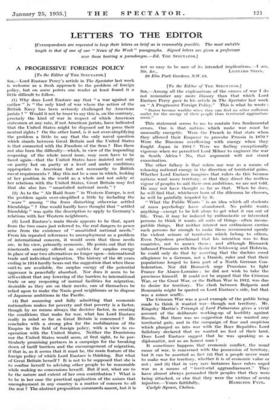[To the Editor of THE SPECTATOR.]
SIR,—Among all the explanations of the causes of war I do not remember any more illusory than that which Lord Eustace Percy gave in his article in The Spectator last week on " A Progressive Foreign Policy." This is what he wrote :
" States become warlike when they can find no other sufficient outlet for the energy of their people than territorial aggrandize- ment."
This statement seems to me to contain two fundamental errors. One is that nations which make war must be unusually energetic. Were the French in that state when they allowed their Emperor to provoke Prussia in 1870 ? Were the Russians overflowing with energy when they fought Japan in 1904 ? Were we feeling exceptionally vigorous when we permitted Lord Milner to' engineer the war in South Africa ? No, that argument will not stand examination.
The other fallacy is that rulers use war as a means of releasing national energy in the direction of territorial gains. Whether Lord Eustace imagines that rulers do this because nations want more territory, or that they direct the restless vigour of peoples to suit their own ambitions, we are not told. He may not have thought as far as that. When he does, he will find that, whichever horn of the dilemma he chooses, he will be painfully impaled by it.
" What the Public Wants is an idea which all students of mass psychology have abandoned. No public wants anything—except to be left alone to get what it can out of life. True, it may be induced by enthusiastic or interested persons to think it wants all sorts of things—often incom- patible things. But neither interest nor enthusiasm carries such persons far enough to make them recommend openly the violent seizure of territories which belong to others. Even Napoleon proclaimed that his intention was to free countries, not to annex them ; and although Bismarck inflamed Prussians with the desire for Schleswig and Holstein, he could only do that by asserting that the duchies owed allegiance to a German, not a Danish, ruler and that their populations longed to form part of a North German Con- federation. Nor did Bismarck urge Prussians to fight France for Alsace-Lorraine ; lie did not wish to take the provinces himself. It could not be argued that the Crimean War, or the Great War, or the Balkan War in 1912, was due to desire for territory. The clash between Bulgaria and Roumania might be quoted on Lord Eustace's side, but that was a minor scuffle.
The Crimean War was a good example of the public being made to, think_ it wanted war—though not territory. Mr. Kingsley Martin's Triumph of Lord Palmerston gives a vivid account of the deliberate working-up of hostility against Russia. But there was no suggestion that we wanted any- territorial gain, and in the campaign of fear and suspicion which plunged us into war with the Boer Republics Lord Salisbury declared that we wanted no foot of their land. Does Lord Eustace suggest that he was speaking as a diplomatist, not as an honest man ?
It sometimes happens that economic conflict, the usual cause of war, is concerned with the possession of territory, but it can be asserted as fact (a) that a people never want to make war for territory, whether it is of economic value or not ; and (b) that in very rare instances have rulers urged war as a means of " territorial aggrandizement." They have almost always persuaded their peoples that they were being attacked, or else that they were the victims of acute














































 Previous page
Previous page